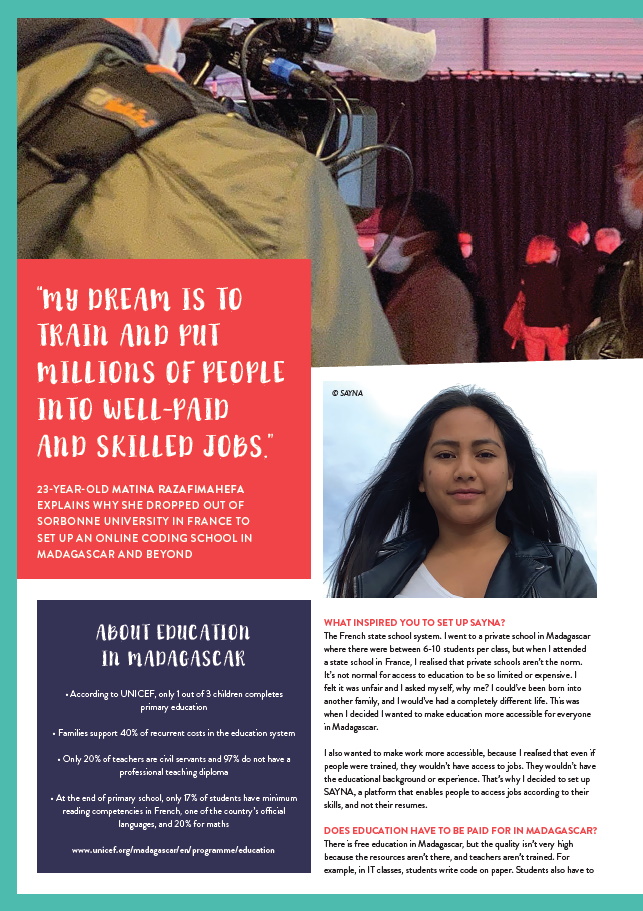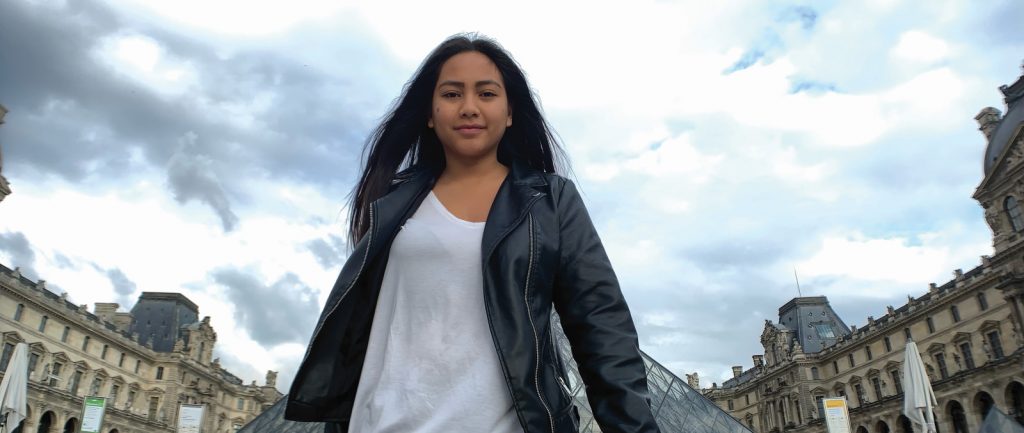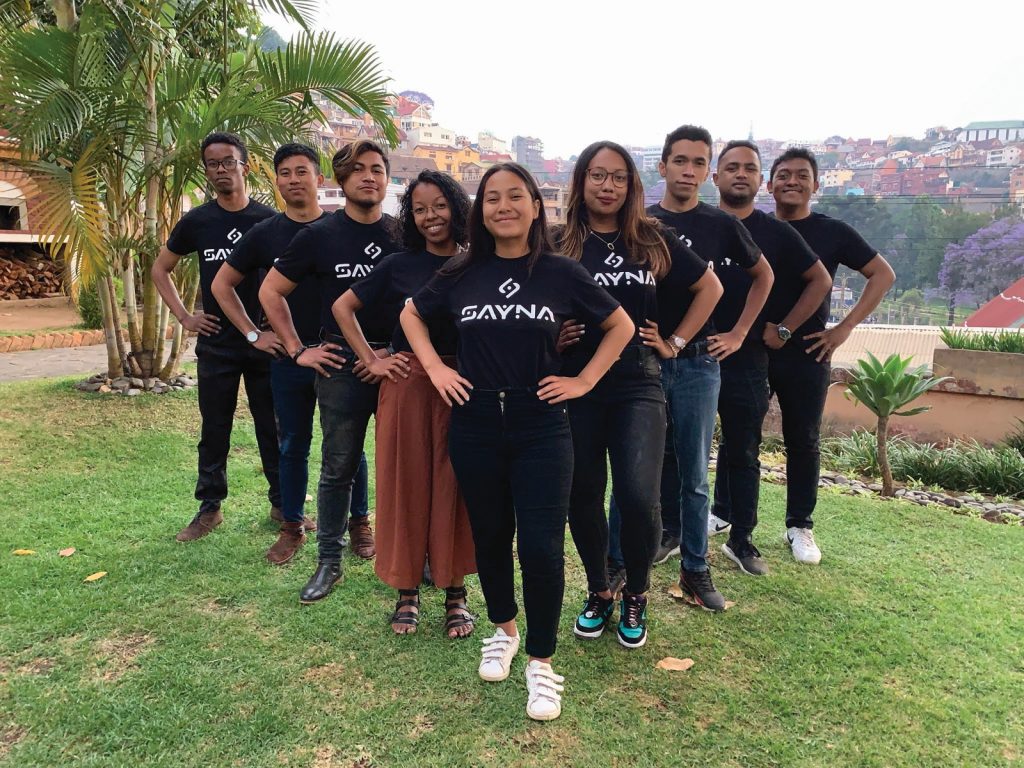“My dream is to train and put millions of people into well-paid and skilled jobs.”
23-year-old Matina Razafimahefa explains why she dropped out of Sorbonne University in France to set up an online coding school in Madagascar and beyond
ABOUT EDUCATION IN MADAGASCAR
- According to UNICEF, only 1 out of 3 children completes primary education
- Families support 40% of recurrent costs in the education system
- Only 20% of teachers are civil servants and 97% do not have a professional teaching diploma
- At the end of primary school, only 17% of students have minimum reading competencies in French, one of the country’s official languages, and 20% for maths
WHAT INSPIRED YOU TO SET UP SAYNA?
The French state school system. I went to a private school in Madagascar where there were between 6-10 students per class, but when I attended a state school in France, I realised that private schools aren’t the norm. It’s not normal for access to education to be so limited or expensive. I felt it was unfair and I asked myself, why me? I could’ve been born into another family, and I would’ve had a completely different life. This was when I decided I wanted to make education more accessible for everyone in Madagascar.
I also wanted to make work more accessible, because I realised that even if people were trained, they wouldn’t have access to jobs. They wouldn’t have the educational background or experience. That’s why I decided to set up SAYNA, a platform that enables people to access jobs according to their skills, and not their resumes.
DOES EDUCATION HAVE TO BE PAID FOR IN MADAGASCAR?
There is free education in Madagascar, but the quality isn’t very high because the resources aren’t there, and teachers aren’t trained. For example, in IT classes, students write code on paper. Students also have to share and pay for books, which means education is definitely not accessible for everyone.
WHAT WERE YOUR AMBITIONS WHEN YOU STARTED STUDYING POLITICAL SCIENCE AT SORBONNE UNIVERSITY IN PARIS, FRANCE?
[When Matina applied to study political science at Sorbonne University in Paris, only 44 applicants were selected out of 40,000. She was one of those 44 applicants.]
I wanted to change the world and I thought political science was the best way to do it. I want to lobby and influence government policies for the good of people and countries. Now I know that I can’t change the world, but I can change something. I’ve discovered that a better way to change the world is to create a business that adds value and makes money. We can’t help people if we don’t have enough money, and the more money we have the more we can help people.
WHY DID YOU DECIDE TO LEAVE SORBONNE IN YOUR SECOND YEAR TO FOCUS ON SAYNA?
When I launched SAYNA, I didn’t realise how much it would grow. I started to have a lot of responsibilities – clients, a team to manage, partnerships, and there were a lot of people who relied on me. So, I decided to say goodbye to Sorbonne with the idea that maybe I’ll go back there.
HOW HAS SAYNA BEEN ABLE TO EXPAND ITS WEB DEVELOPER TRAINING TO COMOROS, CÔTE D’IVOIRE, BENIN AND SENEGAL?
ABOUT EDUCATION IN MADAGASCAR
- According to UNICEF, only 1 out of 3 children completes primary education
- Families support 40% of recurrent costs in the education system
- Only 20% of teachers are civil servants and 97% do not have a professional teaching diploma
- At the end of primary school, only 17% of students have minimum reading competencies in French, one of the country’s official languages, and 20% for maths
The French state school system. I went to a private school in Madagascar where there were between 6-10 students per class, but when I attended a state school in France, I realised that private schools aren’t the norm. It’s not normal for access to education to be so limited or expensive. I felt it was unfair and I asked myself, why me? I could’ve been born into another family, and I would’ve had a completely different life. This was when I decided I wanted to make education more accessible for everyone in Madagascar.
I also wanted to make work more accessible, because I realised that even if people were trained, they wouldn’t have access to jobs. They wouldn’t have the educational background or experience. That’s why I decided to set up SAYNA, a platform that enables people to access jobs according to their skills, and not their resumes.
DOES EDUCATION HAVE TO BE PAID FOR IN MADAGASCAR?
There is free education in Madagascar, but the quality isn’t very high because the resources aren’t there, and teachers aren’t trained. For example, in IT classes, students write code on paper. Students also have to share and pay for books, which means education is definitely not accessible for everyone.
WHAT WERE YOUR AMBITIONS WHEN YOU STARTED STUDYING POLITICAL SCIENCE AT SORBONNE UNIVERSITY IN PARIS, FRANCE?
[When Matina applied to study political science at Sorbonne University in Paris, only 44 applicants were selected out of 40,000. She was one of those 44 applicants.]
I wanted to change the world and I thought political science was the best way to do it. I want to lobby and influence government policies for the good of people and countries. Now I know that I can’t change the world, but I can change something. I’ve discovered that a better way to change the world is to create a business that adds value and makes money. We can’t help people if we don’t have enough money, and the more money we have the more we can help people.
WHY DID YOU DECIDE TO LEAVE SORBONNE IN YOUR SECOND YEAR TO FOCUS ON SAYNA?
When I launched SAYNA, I didn’t realise how much it would grow. I started to have a lot of responsibilities – clients, a team to manage, partnerships, and there were a lot of people who relied on me. So, I decided to say goodbye to Sorbonne with the idea that maybe I’ll go back there.
HOW HAS SAYNA BEEN ABLE TO EXPAND ITS WEB DEVELOPER TRAINING TO COMOROS, CÔTE D’IVOIRE, BENIN AND SENEGAL?
We have a team in Madagascar and Paris, but a lot of what we do is semiautomated, so we mainly work online and with partners in those countries.
HOW MANY PEOPLE HAS SAYNA HELPED SO FAR?
SAYNA has trained and placed over 200 Africans in the global IT marketplace, and we’re going to work with another 27,000 students. This is through the University of Fianarantsoa, one of the big tech universities in Madagascar.
HOW DO YOU FEEL ABOUT BEING IN THE PUBLIC EYE?
[Matina has appeared in various high-profile interviews for DuoLingo, France 24, Change Now and others, and has won the Anzisha Prize, which celebrates innovative young African entrepreneurs.]
I find it hard to accept being in the public eye. It feels weird, especially in Madagascar where there are always people asking me for a selfie. But, at the same time, my team tell me that I’m the voice behind SAYNA and I understand that I have a responsibility to be that voice. Overall, I feel honoured to be able to represent my team at SAYNA and my country on an international scale. It’s quite exciting!
WHAT HAVE YOU LEARNED ABOUT YOURSELF THROUGH LAUNCHING SAYNA?
I used to play tennis, which requires a lot of resilience. You lose a lot, and it can be difficult to manage your emotions when this happens. When I started SAYNA, I knew I could manage my emotions, but I didn’t know I was capable of absorbing so much knowledge, and so quickly. I didn’t know anything about finance, managing teams or marketing; I learned everything from scratch, and I’ve found that I’m more capable than I thought.
WHAT ARE YOUR HOPES FOR YOUR FUTURE?
I strongly hope that we will be able to train and put millions of people into well-paid and skilled jobs. This is my dream!
• Get involved with different associations or organisations that pique your interest. Be active in the things you love to do. Be curious. Go to conferences and events. For example, if you love sports, become an intern for a sports agency. You won’t know whether your interests will lead you to your dream job unless you’re active and curious.
• Don’t be afraid to fail. In France and Francophone countries, you’re not encouraged to fail, but that’s when you learn. You need to fail to help you grow as a person, be resilient, and understand that life isn’t always easy.
ABOUT SAYNA
SAYNA performs two roles: it is both an online learning platform aimed at developing learners’ IT skills, and a crowdsourcing platform aimed at providing innovative, digital solutions for clients.
AN ONLINE LEARNING PLATFORM
Reviewed and reinvented over time, SAYNA’s training programme has been translated into a gamified course, which provides a rich and unique experience for learners. Learners are ‘placed’ in a space universe where they must conquer planets to validate key skills. At present, the training programme has been divided into seven content themes that promote the development of skills in web development, graphic design, digital marketing, IT management and SEO. Importantly, there are no pre-requisite qualifications needed to undertake SAYNA’s training programme, which can be adapted to everyone’s needs, including novices.
A CROWDSOURCING PLATFORM
SAYNA is also a crowdsourcing platform intended to offer trainees access to the IT job market in a fair and sustainable way. Clients’ IT projects are broken down into micro-tasks, which are redistributed to the community of freelance developers, who have trained with SAYNA. In this way, projects are completed very quickly thanks to the dozens of developers , called Microtaskers©, working on the same project. The objective is to provide work to a maximum number of Microtaskers©, depending on their skills and availability.
ALGORITHMS
The bridge between the crowdsourcing and training platforms is connected by an algorithm, which selects the profiles of SAYNA’s Microtaskers© whose skills match the micro-task in hand. As they work with SAYNA, Microtaskers© can continue their training, move up through a total of six grades, and increase their earning potential from 25% to 50% of the cost of the task.
For more information, visit: http://sayna.io
GET SOCIAL WITH MATINA AND SAYNA





